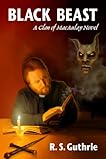The best thing I have ever done as a writer is actually finishing the project, followed closely by getting involved with other writers through social media.
Over the years, I have had many great ideas—at least, I think they’re great—for novels. The list, when I write it down, spans several genres, and the stack of paper I’ve wasted on—I mean, devoted to them is high. But until I finished The Bones of the Earth nearly two years ago, I had never even gotten close to completing a novel-length story.
That’s why I was so pleased to complete it, and I did not shy away from revising, re-writing, submitting it to beta-readers, an editor and to reviewers. I wanted feedback. I went back and changed it several times, and while revising, revised some passages over and over again.
But while refining and polishing your work is certainly essential, it’s useless until you actually complete something. It’s not a story until you bring the reader to some kind of satisfying conclusion, tie up your loose ends and resolve the conflicts.
Unlike those writers who say “I don’t like writing; I like having written,” I actually like the process of putting words on the screen or page. Selling my words, however, is not something that I enjoy. But I recognize that without marketing and distribution, writing a complete book is not very useful. What’s the point of writing without readers?
That’s why, after actually writing a novel, the next best thing I did was to engage with other writers. Sympathetic fellow writers are legion, and easy to find through media like Twitter and online forums. They’ve provided great advice, but most important, encouragement simply by reading the words I write. And kind words left as comments on my blog have made a huge difference.
Other authors and readers have also provided invaluable advice and information on that long road that’s called publishing, the process of getting your book, however well polished and thoroughly reviewed, edited and tweaked it may be, in front of readers’ eyeballs.
It amazes me that such talented and knowledgeable people provide this information for free. Want to know the essential steps you should take to promote your book? There’s no end to the strategies, advice and tips available at no cost from some very smart and experienced writers on the Internet. For free!
Biggest mistake
The biggest mistake I have made, my greatest regret, is taking too long to complete this work. I took more than five years to write The Bones of the Earth.
I also regret not finishing another work that I began even before that book: a novelized memoir of my father-in-law, focusing on his time in the Soviet Red Army and his escape from a German POW camp in 1942. I did many interviews with him and a lot of other research, but did not complete it before he passed away. His story is my current work in progress.
On the other hand, I am a better writer at this stage of my life than I ever have been before. Sometimes I will look at stories I wrote in my 20s and shudder.
My life experiences, particularly as a father, informed my writing of my first-finished novel. Certainly, the book would have been different if I had written it 10 years ago. So maybe, the long time was a necessary part of my maturing as a writer (if not as a man).
I have gotten over the performance anxiety that I think a lot of potential writers feel—the fear of rejection that keeps so many from even trying. Partly, that’s because I have been a professional writer of business articles for 20 years. I know that readers find my writing acceptable, at least—that I can measure up to the professional standards of writing. And partly, it’s because of that encouragement of the writing community. So, thank you, gentle readers.
If I have any advice for writers, it’s this: first, write the book. Figure out what the story is and write it down. Re-read it, revise it, make sure there are no loose ends or plot holes or incredible moments. Make it as good as you can.
Then, turn to the greater writing community. You may want to join groups in your own home town, or forums on the Internet. I advise doing both. Take advantage of the knowledge that others have made available. Ask others to read and review your work, and take their advice to heart.
And don’t forget to offer what you have, too.
Please visit Scott's blog


